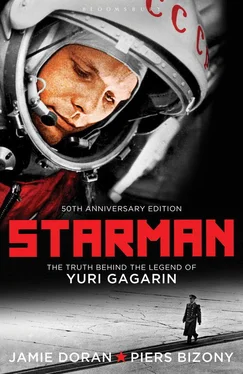Even so, Titov admits that one simple, tantalizing thought went round and round in his head. ‘Probably nothing will happen, but what if? No, nothing can happen now, but what if…?’
Director of Medical Preparations Vladimir Yazdovsky remembers Titov’s palpable tension in the bus. ‘Of course he was hoping that when Gagarin went up to the capsule, a small tear would appear in his spacesuit or something, and immediately the Number Two would be in command of the flight, but Gagarin went into the launch-tower lift-cage very carefully, ascended to the capsule and sat down in the cabin, and when he reported to me that he was safely strapped into place, I gave the order to Titov to remove his spacesuit. He answered abruptly, in a disturbed way, but after that he quietened down. He showed no further emotions.’
Korolev, Academician Keldysh and several other dignitaries were at the gantry’s base to greet Gagarin and wish him a good flight. ‘Well, it’s time to go. I’ve already been inside the ball, to see how it feels,’ said Korolev. He took from his pocket a tiny hexagon of metal, a duplicate of a commemorative plaque sent to the moon on a simple automated ‘Lunik’ probe in 1959. Its deliberate crash-landing had scattered a dozen of the little plaques in all directions. ‘Perhaps one day you’ll be able to pick up an original, Yuri Alexeyevich.’ [12] Burchett & Purdy, Cosmonaut Yuri Gagarin , p. 25.
In his diary Nikolai Kamanin observed drily:
When Gagarin left the bus, everybody let themselves release their emotions and started to hug and kiss one another. Instead of wishing him a nice journey, some of them were shedding tears and saying goodbye as if for ever. We had to apply force to pull the cosmonaut out of their embraces.
Then Korolev strode towards the bunker and disappeared under the hedgehogs. Gagarin went on up and Titov stayed down.
After he had ascended to the top of the pad in the lift, the technicians supported Gagarin’s shoulders as he raised his legs over the rim of Vostok’s hatch and wriggled himself into the ejection seat. Once he had settled, Oleg Ivanovsky and Chief Test Pilot Mark Gallai leaned into the cabin as far as they could and hauled at the loose ends of his straps to tighten him against the seat. Then they plugged his suit hoses into Vostok’s life-support system. Gagarin was now an integral component of his ship – or, rather, an integral part of his ejection system. The couch’s cylindrical lower section incorporated a pair of solid-charge rocket nozzles, but it also contained a small separate oxygen supply in case the ball sprang a leak in orbit, or Gagarin had to bale out somewhere between the earth and true space, maybe at ten or fifteen kilometres’ altitude, where the air is still present but much too cold and thin to breathe.
Down in the blockhouse, Korolev and his technicians saw the life-support monitors flashing their positive signals as the hoses locked into place. Gagarin’s air supply was working and his suit showed no signs of leakage. At the foot of the launch gantry, fretting in the bus, Titov received his last orders for the day, standing him down from the mission once and for all.
Fifty metres above the bus and its disappointed cargo, Ivanovsky rapped on Gagarin’s helmet with his fist for a final goodbye, but one last detail still troubled him: the keypad codes. ‘It didn’t feel right to send Yura into space without any real control over his own craft,’ he recalls. ‘No matter what the psychologists said, he was still a properly trained military pilot.’ Surely the whole point of all Gagarin’s training was to get him out of lethal emergencies in dangerous craft travelling at colossal speeds? Ivanovsky remembers feeling resentful on Gagarin’s behalf. ‘The doctors could not judge if his sanity might crack under pressure, because they were not familiar with any kind of flying.’ If something went wrong with Vostok’s automatic-guidance systems, then surely Gagarin was entitled to flick his own switches and solve the problem his own way, just as he would be expected to pull a spiralling MiG out of trouble without asking permission from a committee of doctors? Vostok was a strange apparatus, but still a flying machine for all that. Just like a plane, it might blow up on take-off, in flight or on landing – Ivanovsky uses the word ‘unpleasantness’ to cover all these hazards. ‘There was always the possibility of unpleasantness to do with flying machines of all kinds,’ he says. The only new twist was that Vostok might do none of these things and just quietly carry on in orbit, with the retro-rockets refusing to fire and Gagarin slowly suffocating, with no hope of rescue, no possibility of getting out of the cabin and parachuting gently to earth, his Vostok an eternal tomb… Ivanovsky sums up the fundamental risk of a cosmonaut’s life: ‘His work, his special expertise, may require his death.’
Ivanovsky worried about all these possibilities, although he acknowledges that nobody in the space community ever spoke openly about such things, least of all the cosmonauts themselves. Of his decision on the launch gantry that day, his small rebellion of conscience, he says, ‘How should I know why I did it? I must have been undisciplined for a moment.’ He leaned through the hatch one last time, signalling for Gagarin to open his faceplate, so that they could talk without using the radio link. Conversations on the wire were not private, and this one certainly had to be. Ivanovsky was about to reveal the Big Secret – the three numbers from the six-digit keypad that Gagarin needed to punch in before he could unlock the spacecraft’s manual controls.
‘I said, “Yura, the numbers are three, two, five.” and he smiled. “Kamanin’s already told me.” he said.’
Even the hard-hearted Stalinist had been overcome with a dose of humanity at the last moment. As it turned out, so had Gallai and Korolev, although their contempt for the keypad was never in much doubt. Anyway, no more Big Secret. It must have been comforting to know that three other people, including the Chief Designer himself, had broken the rules. In theory Ivanovsky was betraying an official State secret and could have been sent to a prison camp for his crime.
Ivanovsky felt a little happier as he squeezed Gagarin’s gloved hand one last time. He and Gallai prepared to seal the capsule, assisted by military Chief of Rocket Troops Vladimir Shapovalov and two junior pad-staffers. First they checked the electrical contacts on the hatchway’s rim to make sure that they registered a clear and unambiguous signal. Once the hatch itself was locked down, the contacts would confirm that everything was airtight. They would also prime a series of miniature explosive charges set into the attachment ring, which could blow the hatch at a millisecond’s notice, just in case Gagarin needed to eject during a launch failure. The contacts seemed to deliver the right signal, so they manhandled the hatch into position and began to secure the first of thirty screw-down bolts along its circumference. They tightened the bolts in opposing pairs in order to mate the seals evenly.
The instant they had secured the final bolt, the gantry telephone rang. ‘We thought this would be Korolev from the blockhouse, ordering us to climb down from the launch platform,’ Ivanovsky remembers.
Not quite. It was Korolev, but he sounded far from happy. ‘Why aren’t you reporting what’s going on up there?’ he demanded. ‘Have you sealed the hatch properly?’
Ivanovsky assured him that they had, just seconds ago.
‘We don’t have KP-3,’ Korolev barked. (KP-3 was the required electrical signal from the contacts on the attachment ring.) ‘Can you remove and reseal the hatch?’
Ivanovsky warned Korolev that re-securing the hatch could delay subsequent launch preparations by at least thirty minutes. ‘There is no KP-3,’ Korolev insisted with his habitual logic. So the hatch had to come off. Ivanovsky thought for a terrible moment how Gagarin might feel when he saw the dawn’s early light invading his cabin from a suddenly wide circular hole above his head. ‘I said to Korolev, “Can I just tell Yuri? He’ll be distressed, and he’ll think the hatch is coming off because the flight is cancelled, and we’re going to pull him out of the capsule.” Korolev said, “Don’t worry. Get on with your work in peace. We’ll tell Yura.”’ But Ivanovsky remained agitated. ‘In peace? In peace! You can imagine the state we were in. We dedicated our six hands, three pairs, to these thirty little screws, and we had to undo them all with a special key. The hatch panel weighed about a hundred kilos, and it was a metre wide, a massive piece. It wasn’t a shameful incident at all, but it was certainly embarrassing.’
Читать дальше












